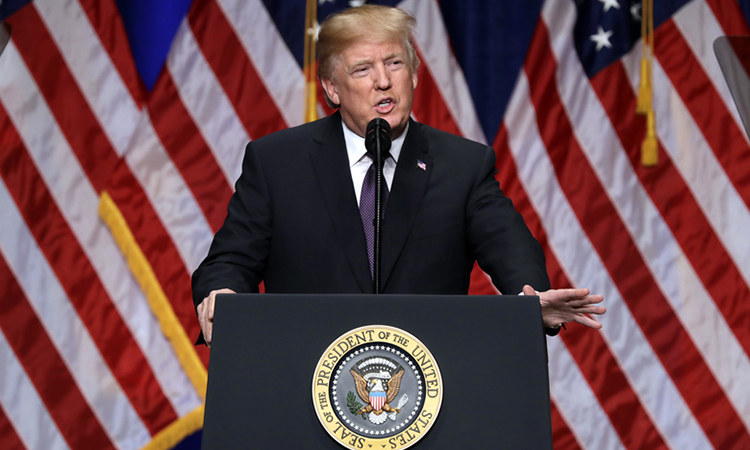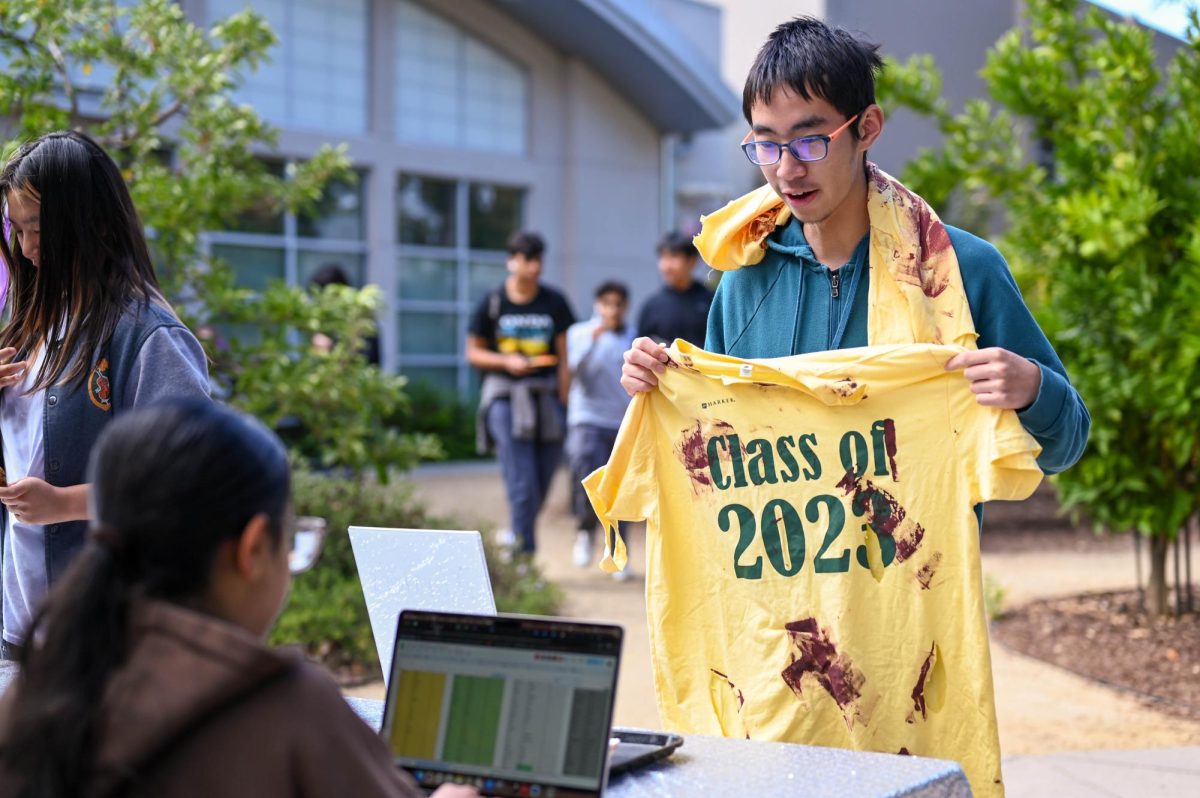Former president Donald Trump won the Iowa caucuses on Jan. 15, defeating Florida Gov. Ron DeSantis and former United States Ambassador to the United Nations Nikki Haley, who placed second and third respectively.
Only around 110,000 voters of the 719,000 registered Republicans in Iowa braved the sub-zero Iowa weather and turned out to caucus sites on Jan. 15, far less than the 187,000 in 2016. Trump received the support of 51% of caucusgoers, a majority and the largest share for a non-incumbent president in modern American history. DeSantis garnered 21.2% with Haley close behind at 19.1%.
Out of Iowa’s 40 delegates to the Republican National Convention, which will formally elect a presidential nominee in July, Trump won 20, DeSantis nine, Haley eight and Trump-aligned entrepreneur Vivek Ramaswamy three.
Upper school world history teacher Jonathan Rim was startled by the record-breaking results, but he thinks that there is still time for the tables to turn. The next major Republican primary was in New Hampshire on Tuesday, a one-on-one matchup between Trump and Haley.
“I was actually surprised that Donald Trump did as well as he did,” Rim said. “But I think overall, New Hampshire is going to be interesting because it’s a pretty independent and moderate state compared to Iowa. I think this is Nikki Haley’s chance to prove herself: she needs to finish either first or very close to first, or else she’s going to be pretty much done as well.”
The former president once again dominated, garnering almost 54.4% of the votes cast in New Hampshire, while Haley trailed with 43.3%. Haley vowed to continue the fight through the primary in her home state of South Carolina and until Super Tuesday, while Trump expressed anger over Haley’s decision, wanting to divert efforts away from the Republican nomination to the general election against President Joe Biden.
Ramaswamy garnered only 7.7% of the Iowa vote and dropped out of the race soon after the Associated Press called the results of the caucuses, endorsing Trump shortly after. Trump’s record win dampened hopes of momentum for Haley going into next week’s New Hampshire primary, and she ultimately lost to the former president by a much closer 11 points. Rim believes that Haley poses a bigger challenge to Trump than DeSantis.
“I think that going into this caucus, Haley already kind of expected to not do as well, but the bigger downfall is DeSantis,” Rim said. “He went to pretty much all 99 counties in Iowa and spent most of his money. The fact that he didn’t do as well means, in my opinion, that he’s pretty much done.”
The Iowa caucus is the key first race of the presidential primary season and serves as a tool to gauge the strength and appeal of presidential hopefuls. Past outcomes have propelled some candidates to the forefront, such as George W. Bush in 2000, while others, including former Maryland governor Martin O’Malley in 2016, have faced setbacks that ultimately altered the course of the election.
Once a leading Republican candidate, DeSantis dropped out of the race on Sunday and endorsed Trump, while former Arkansas governor Asa Hutchinson also suspended his campaign and endorsed Haley. Civil Discourse Club member Timothy Deng (10) believed that the caucus results put pressure on Haley to perform well in the upcoming races, considering Trump’s record margins and performance in the polls, as well as her underwhelming finish in New Hampshire.
“Haley is the strongest contender to be the alternative to Trump, but both of them were overwhelmingly defeated by Trump, just as the polls predicted,” Timothy said. “Although Haley has caught up to DeSantis considerably, she has to do well in New Hampshire, where there’s a lot more moderate anti-Trump Republicans and independents. And [after Iowa] there’s also pressure on DeSantis to drop out because it didn’t seem he had a path forward.”
On the other hand, Civics student Yasmin Sudarsanam (11) was not surprised at the results of the caucuses and viewed the race for second place as more of setting the stage for the 2028 Republican nomination than for the current election cycle.
“I personally expect to see Trump come in as the Republican candidate for the overall presidential election next year,” Yasmin said. “And I think DeSantis and Haley will continue to battle it out, but I suspect that they’re more over battling who’s going to take the next presidential primary in 2028 than this year. Both definitely have ambitions for 2028 and see the current race as a potential path to the White House in four years’ time.”
Unlike typical primaries in other states, the caucus is run by state parties rather than the state government. Voters make pitches for their chosen candidates and engage in discussion before casting votes by secret ballot. Delegates are allotted for each candidate based upon their performance in the statewide vote, and they select a presidential nominee at the Republican National Convention in July. Republicans have nearly 2,500 delegates, and a candidate needs a 1,215 delegates to clinch the nomination.
The implications of the results extend far beyond state borders. The momentum gained or lost in Iowa can set the tone for the remaining primary and influence voters’ perceptions of candidates across the country.


















![“[Building nerf blasters] became this outlet of creativity for me that hasn't been matched by anything else. The process [of] making a build complete to your desire is such a painstakingly difficult process, but I've had to learn from [the skills needed from] soldering to proper painting. There's so many different options for everything, if you think about it, it exists. The best part is [that] if it doesn't exist, you can build it yourself," Ishaan Parate said.](https://harkeraquila.com/wp-content/uploads/2022/08/DSC_8149-900x604.jpg)




![“When I came into high school, I was ready to be a follower. But DECA was a game changer for me. It helped me overcome my fear of public speaking, and it's played such a major role in who I've become today. To be able to successfully lead a chapter of 150 students, an officer team and be one of the upperclassmen I once really admired is something I'm [really] proud of,” Anvitha Tummala ('21) said.](https://harkeraquila.com/wp-content/uploads/2021/07/Screen-Shot-2021-07-25-at-9.50.05-AM-900x594.png)







![“I think getting up in the morning and having a sense of purpose [is exciting]. I think without a certain amount of drive, life is kind of obsolete and mundane, and I think having that every single day is what makes each day unique and kind of makes life exciting,” Neymika Jain (12) said.](https://harkeraquila.com/wp-content/uploads/2017/06/Screen-Shot-2017-06-03-at-4.54.16-PM.png)








![“My slogan is ‘slow feet, don’t eat, and I’m hungry.’ You need to run fast to get where you are–you aren't going to get those championships if you aren't fast,” Angel Cervantes (12) said. “I want to do well in school on my tests and in track and win championships for my team. I live by that, [and] I can do that anywhere: in the classroom or on the field.”](https://harkeraquila.com/wp-content/uploads/2018/06/DSC5146-900x601.jpg)
![“[Volleyball has] taught me how to fall correctly, and another thing it taught is that you don’t have to be the best at something to be good at it. If you just hit the ball in a smart way, then it still scores points and you’re good at it. You could be a background player and still make a much bigger impact on the team than you would think,” Anya Gert (’20) said.](https://harkeraquila.com/wp-content/uploads/2020/06/AnnaGert_JinTuan_HoHPhotoEdited-600x900.jpeg)

![“I'm not nearly there yet, but [my confidence has] definitely been getting better since I was pretty shy and timid coming into Harker my freshman year. I know that there's a lot of people that are really confident in what they do, and I really admire them. Everyone's so driven and that has really pushed me to kind of try to find my own place in high school and be more confident,” Alyssa Huang (’20) said.](https://harkeraquila.com/wp-content/uploads/2020/06/AlyssaHuang_EmilyChen_HoHPhoto-900x749.jpeg)

















